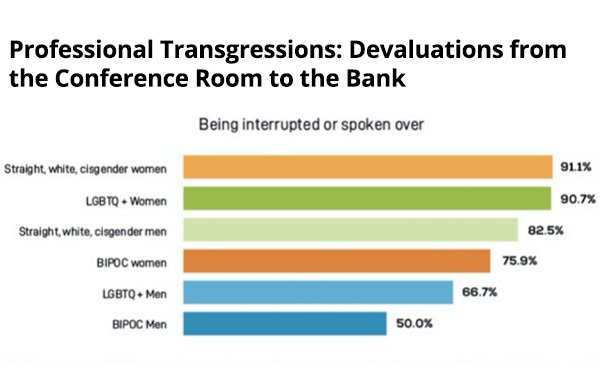
As systemic racism and overt and covert
bias remain important topics of discussion worldwide, an ongoing project from NorthStar, a content marketing company, focuses on the state of the search engine optimization industry and the cost of
bias and diversity across the industry.
The findings, published Wednesday on Moz, provide a snapshot of the thoughts and feeling of 326 SEO professionals.
It’s important to note
that many of the SEOs who shared their stories with NorthStar don’t fit into one group, so the survey findings address that by counting people in each category that applied to them. For example,
a gay Black man’s answers are factored into both the LGBTQ+ and BIPOC (Black, Indigenous, People of Color) analyses, according to the data.
Of the 326 SEO professionals who participated,
231 respondents described themselves as Caucasian. Among the remainder, 32 SEO professionals described themselves as Hispanic, Latino, or Spanish; 28 Black or African American; 18 Asian or Asian
American; 11 Middle Eastern or North African; eight Indian or South Asian; four Native Hawaiian or other Pacific Islander; and three American Indian or Alaska Native. Some of the respondents were
counted in more than one category. (Additional segmentation can be found here.)
advertisement
advertisement
NorthStar began the study by asking SEOs how the
industry compares with the rest of the business world when it comes to discrimination and bias. Some 57.7% of the participants had a different career or significant job experience in another field
before working in SEO.
Some 58.7% of professionals surveyed said they think SEO is about the same as other professions, but among those who disagree, 26% think it is worse, and 15.2% think it
is better.
Slightly more than 40% of both BIPOC and Caucasian SEOs said discrimination is “not a serious problem at all” within their own companies. However, 74% of BIPOC SEO
professionals 67.5% of Caucasian SEOs said bias is a “moderately serious” or “extremely serious” problem in the SEO industry.
Asian and Asian-American SEO professionals
were the most likely to say they experience ethnic bias at least once weekly, followed by Hispanic or Latino.
Most Black or African-American SEO professionals said discrimination was a monthly
or bi-monthly experience for them. Not surprisingly, Caucasian SEO professionals were the least likely to experience racial or ethnic bias, although about a third said they are discriminated against
based on their heritage or cultural identity.
The study did not include questions about religion, so it is uncertain what role that might play. Issues related to ageism or disability issues
were also not addressed.
The survey uncovered many forms of LGBTQ+ and gender bias. Overall, 94.1% of LGBTQ+ SEOs experience bias at least some of the time, and more than a third
experience it at least once a month. However, 72.5% of the heterosexual SEOs also said they feel gender discrimination at least some of the time.
The study also explored the impact and cost of
bias. About four in 10 SEO professionals said they experienced bias in the past year.
We asked them what impact it has had on their productivity, career trajectory, and happiness. Some 69.1%
feel that bias in the workplace has had a negative impact on productivity and sense of engagement, with 38.3% strongly agreeing and 30.8% slightly agreeing.
Some 72.1% feel that bias in the
workplace has had a negative impact on career advancement and earnings, with 39.3% strongly agreeing, and 32.8% slightly agreeing.
About 74.6% feel that bias in the workplace has had a
negative impact on their happiness, confidence, or well-being, with 42.6% strongly agreeing, and 32.0% slightly agreeing.
The study also breaks down gender, ethnicity and age to get an idea of
cost.
For male SEO generalists working in the United States:
- In their 20s, Caucasian male SEOs reported earning an average of $75,312 per year. BIPOC male SEOs in
their 20s reported earning an average of $63,500 per year (18.6% less).
- In their 30s, Caucasian male SEOs reported earning an average of $95,833 per year. BIPOC male SEOs in their 30s
reported earning an average of $89,091 per year (7.6% less).
- In their 40s, Caucasian male SEOs reported earning an average of $115,937 per year. BIPOC male SEOs in their 40s reported earning
an average of $90,417 per year (28.2% less).
For female SEO generalists working in the United States:
- In their 20s, Caucasian women SEOs reported earning an
average of $75,384 per year. BIPOC women SEOs in their 20s reported earning an average of $61,250 per year (23% less).
- In their 30s, Caucasian women SEOs reported earning an average of
$86,571 per year. BIPOC women SEOs in their 30s reported earning an average of $86,094 per year (0.6% less).
- In their 40s, Caucasian women SEOs reported earning an average of $109,375 per
year. BIPOC women SEOs in their 40s reported earning an average of $101,094 per year (7.6% less).
Marketers can read more about the findings here.